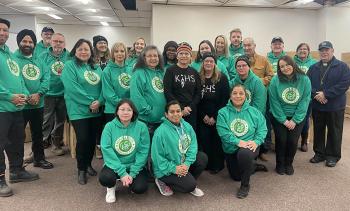Image Caption
Summary
Local Journalism Initiative Reporter
Windspeaker.com
For more than a decade, Bimaychikamah School in the remote Ojibwe community of Slate Falls Nation in northern Ontario has benefitted from the fundraising of the non-profit organization Mikinakoos Children’s Fund. And this year is no exception.
With about three weeks left in its Warm Clothing campaign, Mikinakoos is more than two-thirds of its way to its $15,000 target to help pay for winter clothing for not only Slate Falls Nation, but 17 other First Nations communities. It collaborates with the Keewaytinook Okimakanak First Nations, Keewaytinook Internet high schools, and Fort Hope First Nation.
“This is a service that not only provides to the children here at the school but is also extended to the community at large for siblings and extended family members. Any spare clothing is sent to other communities, shelters, and transition homes in need,” said Bimaychikamah School principal Danick Clavel.
There are approximately 200 band members living in the Treaty 9 community. Bimaychikamah School has an enrollment of 48 children with a split-grades class structure from kindergarten to Grade 8.
The warm clothes fundraising initiative was launched in the beginning of November and has been one of the staples of Mikinakoos, since the charity began operating in Thunder Bay in 2013.
The private donations make up only a portion of the Warm Clothing initiative, says Mikinakoos executive director Emily Shandruk.
Money has also been received from the TD Ready Commitment Fund with $50,000 to be split over this year and next year.
The initiative will purchase more than 1,500 coats for children.
Outfitting the students in warm winter clothing is particularly important as many of the schools’ programs are land-based activities.
“The thing that Mikinakoos really strives around is we are 100 per cent community-led,” said Shandruk. “We don't do anything unless the community has reached out to us to say, ‘Hey, we would love support around this’.”
‘Nothing for us without us’ is the motto of organization founder James Morris, Anishnabe from Big Trout Lake.
With that in mind, Mikinakoos has met such needs as providing backpacks full of food with accompanying can openers so students and their families had food in the evenings and on weekends for two to three weeks.
The food campaign was particularly important during the coronavirus pandemic when isolation efforts made it almost impossible for people to travel south to supplement their grocery shopping. The usual year-round northern Ontario nutrition program, which saw fruits and vegetables from southern Ontario farmers sent north, kicked in late.
Whether it’s food or clothing, a “chunk out of any funding we receive” goes for transportation, says Shandruk.
Keewaytinook Okimakanak First Nations and Keewaytinook Internet high schools have regular transportation in and out of the communities, so Mikinakoos will be making use of that. But shipping a pallet to Fort Hope can cost anywhere from $3,000 to $4,000, which comes out of Mikinakoos’ fundraising budget.
Transportation costs are also dependent on weather.
“Ice roads do reduce costs but they don't eliminate it, and you're still at the mercy of ‘can you get it on a truck?’ We almost have to get in line now for next year,” said Shandruk.
“The other program that we run that has been very successful and very much in demand is around our healthy living program,” she said.
That program includes arts to sporting equipment to a wide range of activities.
Funding just received from Jump Start will allow Mikinakoos to run a volleyball camp at Missabay Community School in Mishkeegogamang Ojibway First Nation in January. Jump Start has also provided funding for baseball, hockey and basketball camps.
“It's phenomenal to not only work with the youth, but a lot of the older youth, like teens, want to learn how to, once our coaches leave, how to lead the session and actually be coaches,” said Shandruk.
For Clavel, the support from Mikinakoos, in all areas, has been invaluable.
“This service provides nurturing on not only a supply-based platform but the building (and) associating of social-emotional relationships with a world beyond the borders of remoteness and isolation,” said Clavel.
Over her last 10 years as a full-time teacher and principal, Clavel says resources have been “virtually non-existent,” created mostly at a grassroot level from differentiated instruction programs put in place at the school with student participation.
“Due to the support from the Mikinakoos…the school has been able to provide many in-school programs and community, and extracurricular activities for our northern school and children,” said Clavel.
The fundraising campaign for the Warm Clothing initiative runs until the end of December. Donations can be made online here: https://interland3.donorperfect.net/weblink/weblink.aspx?name=E351926QE&id=2&fbclid=IwAR2dVGVjOdQru2rCUIIGf_xHHWL_ppV5rlDx7EvkaUQA_S0r9IKuQ5RJANw

